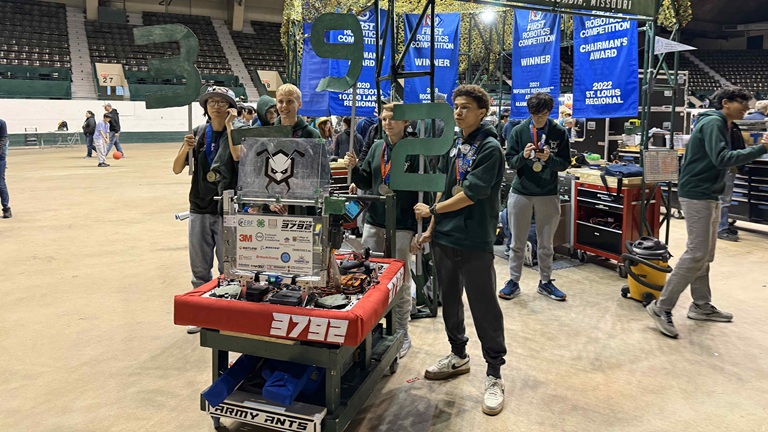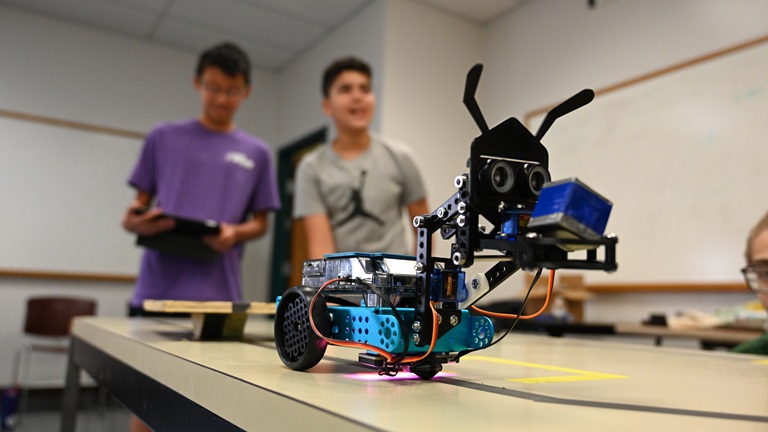July 14, 2025
Mizzou Engineering is helping local high school students gain the skills and confidence to thrive in a demanding profession.

At Mizzou Engineering, we provide students with opportunities to learn by doing, even before they enroll. A local initiative co-sponsored by the College offers high school students the opportunity to explore the world of robotics through hands-on experience.
The Army Ants team of Columbia high school students builds robots for competition and engages in community STEM education. Members of the team graduate with advanced technical and teamwork skills.
In March, the Army Ants were the only team out of 51 to win the prestigious FIRST Impact Award at the 10,000 Lakes FRC Regional in Minneapolis.
“This award is especially meaningful to me because it symbolizes all the work that we’ve done in the past few years,” said team member Sadra Aliakbarpour. “We fill a unique niche in our community.”
Additionally, the Army Ants captained the second-place alliance in the tournament finals, where robots compete in alliances of three teams. The highest ranked teams are seeded as alliance captains and select their alliance partner teams.
The wins in Minneapolis earned the Army Ants an invitation to the FIRST Robotics Competition Championship in Houston. This year marked their fifth appearance at the prestigious international event and their first time reaching the playoffs. Ranked 10th out of 75 teams in their division, the team placed among the top 100 teams worldwide out of nearly 4,000.
“We were thrilled with the experience at the championship and with our entire season,” said Kevin Gillis, Mizzou Engineering professor and one of the chief mentors for the team. “I loved watching them hone their skills and work together as a team.”
Building a community
Throughout the year, the Army Ants foster the next generation of engineers. During the “build season,” the team meets six days a week to build a competitive robot. The rest of the year, they run camps and carry out other activities to extend STEM opportunities to underprivileged students.
Mizzou Engineering provides logistical support for those camps, proceeds from which help fund team travel, and helped the team set up a workshop. Faculty like Gillis also serve as mentors to the team.
“The Army Ants are well-known in the Midwest high-school robotics community as a ‘Mizzou team,’” Gillis said.
Many students who encounter the Army Ants at their STEM camps and at FIRST robotics events are inspired to enroll at Mizzou Engineering. Eligible first-year students may apply for FIRST scholarships through the College. Once enrolled, they get to pursue their passion for robotics in several student organizations – such as MU Robotics and the Student Underwater Robotics Foundation – and work with Spot, Mizzou’s famous autonomous robot.

Developing skills
Not all Army Ants choose careers in robotics, but the vast majority — 89% over the last three years — pursue STEM-related fields, with 68% choosing engineering and computer science.
Phillip Lei (MS CS ’25) was one of them.
“In Army Ants, I learned that I liked the problem solving and creation aspects of engineering,” he said. “That helped put me on a path of learning more about computer science and ultimately choosing that as my major.”
Lei also credits the Army Ants for teaching him teamwork.
“Working on a large, collaborative and driven team on big projects for competitions prepared me for working in groups and engineering internships down the line,” he said.

As an Army Ant, Sandro Pereverzev (BS ChE ’25) learned gear ratios, 3D modelling in computer-assisted drafting (CAD), fabrication and other engineering principles. He put these skills to work in the Mizzou AIChE student organization, designing a car powered by a chemical energy source.
“Working on such a big team also improved my teamwork and communication skills,” he said. “Working with multiple subgroups was a good warm-up for corporate cross team projects during my cooperative education experience at Bayer.”
The Army Ants gave senior Amanda Arbuckle programming experience and taught her critical thinking, time management, creative problem-solving and communication skills.
Arbuckle’s love of robots and biology led her to Mizzou, where she chose biomedical engineering as her major. She is currently completing a co-op at Regeneron Pharmaceuticals in protein biochemistry.
“Being able to communicate clearly and concisely has made group projects run very smoothly, allowing us to spend more time on creative problem solving and less on sorting out foundational details,” she said.
Engineering their futures
Gillis sees a direct link between the skills Army Ants acquire and their future careers.
“Many of these students become experts in CAD software and programming,” Gillis said. “They gain experience with advanced sensors, image processing and feedback control systems — skills that, in some cases, even exceed our coursework.”
The dynamic partnership between Mizzou Engineering and the Army Ants is helping shape the next generation of engineers, one robot at a time. It’s a testament to the power of mentorship, teamwork and the lasting impact of hands-on learning in STEM.
“I learn so much from these high school students, and my experience has changed how I teach,” Gillis said. “They’re the STEM leaders of tomorrow.”
Join the next generation of innovators. Discover Mizzou Engineering camps and events!